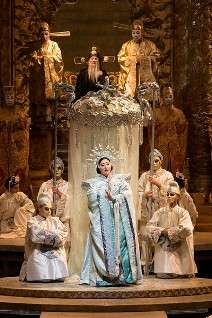|
Back
A Zeffirelli Classic Refreshingly Revived! New York
Metropolitan Opera
09/23/2015 - & September 26, 29, October 3, 22, 26, 30, November 3, 7, 12, 2015, January 11, 15, 18, 22, 26, 30, 2016
Giacomo Puccini: Turandot
Christine Goerke (Turandot), Hibla Gerzmava (Liù), Marcelo Alvarez (Calaf), James Morris (Timur), Ronald Naldi (Emperor Altoum), Dwayne Croft (Ping), Tony Stevenson (Pang), Eduardo Valdes (Pong), Patrick Carfizzi (Mandarin)
The Metropolitan Opera Orchestra and Chorus, Paolo Carignani (conductor)
Franco Zeffirelli (production and sets), Anna Anni and Dada Saligeri (costumes), Gil Wechsler (lights), Chiang Ching (choreographer)

C. Goerke (© Marty Sohl/Metropolitan Opera)
After the tepid opening night new production of Verdi’s Otello, this revival of one of the company’s warhorses proved an instructive comparison. Franco Zeffirelli’s opulent production of Puccini’s last opera, which premiered in 1987, is now approaching its third decade. Yet it remains as strong and as crowd pleasing as ever. Judging by the enthusiastic near-sell out audience at its second performance, which I attended, its endurance should serve as a fine lesson in an era when so many of the Met’s most memorable achievements – Zeffirelli’s no more than any others – are getting the axe in favor of disappointing concept productions that seem designed more for HDTV projection in cinemas than the enjoyment of loyalists in the house. Opera is indeed about spectacle, and the New York audience thirsts for it.
The grand news of Turandot’s return was the assignment of the title role to the rising star Christine Goerke, already well known for numerous triumphs as several Richard Strauss heroines and on tap to sing Brünnhilde in the next outing of the Met’s "machine" productive of Wagner’s Ring of the Nibelung a few seasons hence. Ms. Goerke took up the challenge with alacrity and never wavered in power or stamina. Perhaps inevitably there were some rough spots in Turandot’s introductory aria "In questia reggia," notoriously difficult both for its high tessitura and lack of any warm up singing. The temptation, or necessity, to sharp on some of the part’s high notes at times seemed too great to resist. But the interpretation registered a success, helped in no small way by truly a compelling dramatic interpretation that explored the character’s icy front and inner weakness. We should welcome as a great luxury the opportunity to compare Goerke’s performance with the forthcoming ones later this season of Lise Lindstrom and Nina Stemme.
As her suitor Calàf, the talented dramatic tenor Marcelo Alvarez seized the role with uncommon energy. The high notes were not always beautiful, particularly at the climax of "Nessun dorma," but his passionate ardor ran high throughout the evening. Calàf’s own admirer Liù was outstandingly sung by Hibla Gerzmava, an artist whose impressive growth imbued the role with a refined and sympathetic soubrette quality and ethereal pianos. James Morris, now having clocked in over forty seasons with the company in dozens of leading roles, found a respectable place as Calaf’s father Timur, the blinded and exiled King of Tartary. Performers of the role must command pathos and resignation, and Mr. Morris’s ample dramatic powers delivered an impressive success. Met roster singers capably filled out the comprimario parts. Maestro Paolo Carignani commanded a rousing performance from orchestra and chorus.
Paul du Quenoy
|